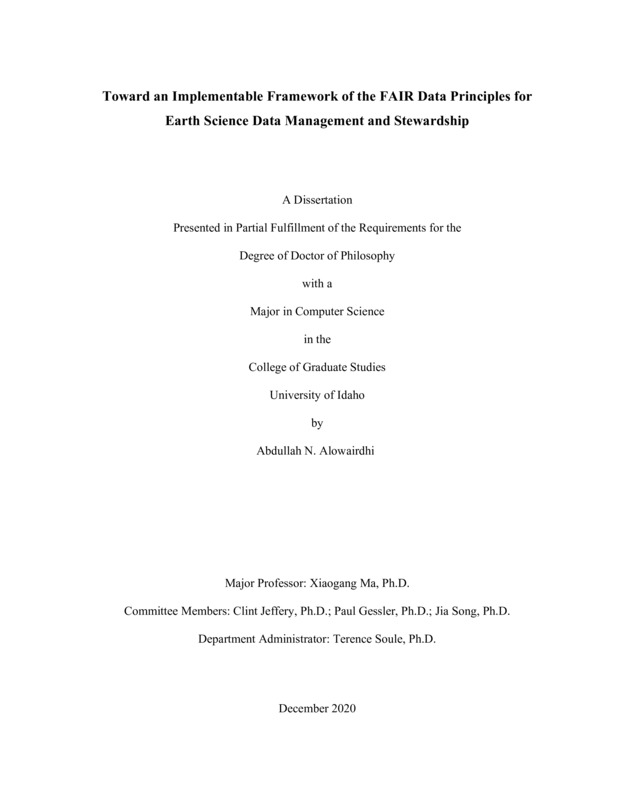Toward an Implementable Framework of the FAIR Data Principles for Earth Science Data Management and Stewardship
Alowairdhi, Abdullah Nasser. (2020-12). Toward an Implementable Framework of the FAIR Data Principles for Earth Science Data Management and Stewardship. Theses and Dissertations Collection, University of Idaho Library Digital Collections. https://www.lib.uidaho.edu/digital/etd/items/alowairdhi_idaho_0089e_12001.html
- Title:
- Toward an Implementable Framework of the FAIR Data Principles for Earth Science Data Management and Stewardship
- Author:
- Alowairdhi, Abdullah Nasser
- ORCID:
- 0000-0001-7824-568X
- Date:
- 2020-12
- Keywords:
- Data Science Data Stewardship FAIR principles Fuzzy FAIR
- Program:
- Computer Science
- Subject Category:
- Computer science
- Abstract:
-
Abstract: This Ph.D. research aims to improve the data management and stewardship for Earth sciencedigital resources by developing an implementable framework for the FAIR data principles. The lack of a pragmatic framework to facilitate the translation of FAIR data principles into the digital world has led to a gap between the theories and implementation of those principles for Earth science data stewardship. To overcome this challenge, we ask four themed questions to guide the research activities: First, how can we verify the validity and tautology of FAIR data principles? Second, how can we theoretically address FAIR data principles? Third, how can we technically approach FAIR data principles? Fourth, how can we efficiently evaluate the FAIRness of a digital resource? The two formal logical methods used in this work are the Truth Table and the Natural Deduction. The development method used is semantic web technologies supported by a FAIR ontology. Furthermore, the FAIRness level evaluation method used is a Fuzzy logic method. We show that FAIR data principles are valid and tautological, which resulted in the formulation of FAIR theorems. This research is the first research that implements formal logic to verify the FAIR data principles and uses fuzzy logic to assess the FAIRness level, which helps set up a bridge between the human conceptualization and the machine implementation of the FAIR data principles. We also show the prototype of FAIRtool.org, a semantic web application that adopts FAIR data principles, and the creation of the Fuzzy FAIR Assessment Framework (FFAF). The development of the FAIR theorems establishes rules to translate the FAIR data principles into machine-readable formats, which are necessary for the implementation of FAIR in the cyberinfrastructure. Using the FFAF model to assess the FAIRness of a digital resource led to an efficient FAIRness level evaluation. We demonstrated the outputs of this research with two examples from Earth science, the “NCDC Storm Events Database” use case and the “Data for Building an Open Science Framework to Model Soil Organic Carbon” use case. The Earth science community is actively promoting the adoption and implementation of FAIR principles. This Ph.D. research provides evidence about the logic validity of FAIR principles. The pilot system and examples show the implementability of FAIR principles in the cyberinfrastructure for various datasets and other digital resources. With more work and community of practice, this advancement in cyberinfrastructure will eventually promote the precision of Earth science data management and stewardship to a new level.
- Description:
- doctoral, Ph.D., Computer Science -- University of Idaho - College of Graduate Studies, 2020-12
- Major Professor:
- Ma, Xiaogang
- Committee:
- Jeffery, Clint; Gessler, Paul; Song, Jia
- Defense Date:
- 2020-12
- Identifier:
- Alowairdhi_idaho_0089E_12001
- Type:
- Text
- Format Original:
- Format:
- application/pdf
- Rights:
- In Copyright - Educational Use Permitted. For more information, please contact University of Idaho Library Special Collections and Archives Department at libspec@uidaho.edu.
- Standardized Rights:
- http://rightsstatements.org/vocab/InC-EDU/1.0/

